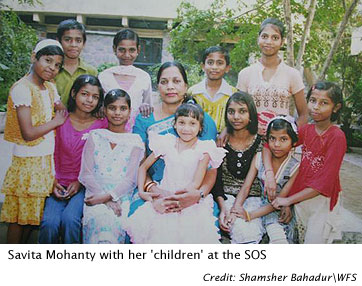A Paid Job As A Mom Is Win/Win In India
 From WomeneNews.
From WomeneNews.
Twenty-one years ago Savita Mohanty chanced upon a job ad in a newspaper.
The work appeared to be emotionally demanding but she decided to apply anyway.
Today, she is mothering 11 orphaned and abandoned children between the ages of 8 and 13. Her address: Jeevan Jyoti, House No. 7, Greenfields, Faridabad.
House No. 7 is one of a number of households in the first SOS Children's Village in India, founded in 1964 and now counting 224 young people who have grown up and moved off to their adult lives.
The village is designed to provide each of the resident children--currently numbering 217--with a loving home and supportive extended community. Each child is assigned to three counselors. Their assigned mothers have access to yoga and meditation workshops to help ease the heavy caretaking stress.
There are also workshops for moms and teens to take together, on issues such as sex education, health, hygiene, child protection policy and child rights and responsibilities.
Assigning single women a central caretaking role was a key principle of the group's Austrian founder, Dr. Hermann Gmeiner, a pediatrician and philanthropist who died in 1986. Gmeiner established SOS Villages in Europe in the late 1940s. He lost his own mother when he was quite young and after her death was raised by a teenage sister. That sister, Elsa, became the role model for an SOS mother, according to the group's Web site.
Some of Mohanty's children have left home by now and she speaks proudly of them.
One is Ranjana, 22, whose artwork covers the walls of House No. 7. The third year fine arts student at South Delhi Polytechnic spends most of the year away at school. But she still comes home on vacation to see her family and lend her mother a much-needed hand.
Her sister, Manika, 23, has also moved away. With a diploma in fine arts from the South Delhi Polytechnic for Women, she is looking forward to a career in web design. But she also comes home for vacation.
(The children's names have been changed to protect their privacy.)